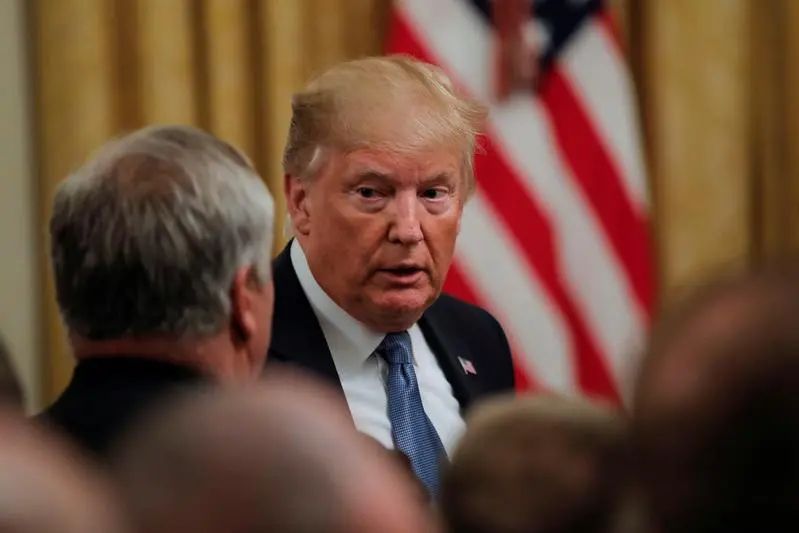PHOTO
With the isolationist, nationalistic slogan “America First,” Trump won the 2016 US presidential election. In his view, as in the view of a large portion of Americans, the US system pays more attention to the world than it does to America. The current world order is taking advantage of the US. America bears most of the NATO burden. It is the world’s first donor. It finances a fifth of the UN budget. Trump declared that the US entanglement in Middle Eastern conflicts had cost the US $7 trillion and the country got nothing out of it. Trump ran on an isolationist agenda. While in office, his anti-Europe, anti-NATO narrative has created unnecessary enemies for him and the US. However, Trump should remember that the US is “first” in world affairs because it is not alone.
Since the Second World War, the transatlantic alliance has been at the core of global geopolitics. Trump should remember that the confrontations that were won by the US were when Europe and the UN were on its side. The first Gulf War, which was a major success for the US and created an economic boom that benefited the Clinton administration, was conducted in alliance with Europe and the UN. On the other hand, the second Gulf War, in which the US invaded Iraq without the acquiescence of the UN and much of Europe, was a major disaster. The Iraq war cost the US more than $800 billion, the lives of thousands of its soldiers, and a greatly damaged image in the world.
Today, if the US wants to be successful in countering the malignant activities of Iran, it cannot be alone. It needs the support of Europe and the blessings of the UN. So far, Trump’s confrontational style has created more enemies than the US can afford. He unilaterally withdrew the US from the Iran nuclear treaty without pleading his case with the Europeans. The Europeans feel bullied by the Trump administration. The US is applying sanctions and exercising maximum pressure on Tehran, but unilateral sanctions do not work.
The US president should be careful in choosing his enemies. His confrontational style is turning off the Europeans and this is not to his advantage. On May 13, when Pompeo met with European leaders in Brussels and shared with them intelligence about the Iranian threats, his counterparts were more concerned about the unraveling of the nuclear deal than an attack on oil tankers in the Arabian Gulf. Top EU officials called on the US to use “maximum restraint” and avoid military escalation with Iran.
US coercion, applied simultaneously to both Iran and Europe, seems to have had negative repercussions. On June 28, the governments of Germany, France and the UK declared that a special payment vehicle known as Instex was up and running and ready to facilitate trade between Iran and Europe, circumventing American sanctions. China and Russia were present at the declaration, as both countries are trade partners of Iran and fierce competitors of the US. While the imposed sanctions were intended to isolate Iran, they instead seem to be driving America into isolation.
Iran, meanwhile, is more defiant than ever. It did not flinch at Trump’s threat that it is playing with fire. President Hassan Rouhani, on the other hand, announced that his country would start enriching uranium to “any amount we want.” The Europeans are imploring Iran to stay within the enrichment limit stipulated by the nuclear deal.
While the imposed sanctions were intended to isolate Iran, they instead seem to be driving America into isolation.
Dania Koleilat Khatib
The US needs friends when confronting Iran. We see that Europe is not on the same page as the US. As soon as the USS Abraham Lincoln aircraft carrier arrived in the region, EU foreign policy chief Federica Mogherini declared that the Europeans are keen on keeping the nuclear agreement in place. The EU feels more and more alienated as the US takes unilateral actions, such as pulling out of the nuclear deal, recognizing Jerusalem as the capital of Israel, and recognizing its annexation of the occupied Golan Heights. Trump has shown contempt for NATO, saying it is “obsolete,” and he endorsed the UK’s exit from the EU. However, those positions are going to boomerang back to the US.
America now finds itself at a stalemate with Iran and it needs the cooperation of the Europeans and the international community to bring Tehran back to the negotiating table. Trump’s belligerent style has been counterproductive. He should cherish the transatlantic alliance, as it is the backbone of US supremacy in world affairs, and make sure to bring the Europeans on to his side if he wants to take any action against Iran.
So far, Iran, despite its malignant activities, has convinced many that it is the victim of Trump’s whimsical decision to withdraw from the nuclear agreement in spite of its compliance. Trump’s strength would be boosted if he could convince the world otherwise, but he can’t do it alone — he needs Europe on his side.
• Dr. Dania Koleilat Khatib is a specialist in US-Arab relations with a focus on lobbying. She holds a PhD in politics from the University of Exeter and is an affiliated scholar with the Issam Fares Institute for Public Policy and International Affairs at the American University of Beirut.
Copyright: Arab News © 2019 All rights reserved. Provided by SyndiGate Media Inc. (Syndigate.info).





















